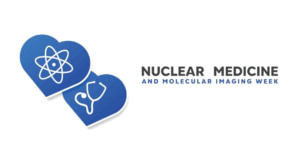Recognize Nuclear Medicine & Molecular Imaging Week
This October 5 through 11, the medical community comes together to observe Nuclear Medicine & Molecular Imaging Week. This observance highlights the remarkable ways nuclear medicine contributes to diagnosing, treating, and monitoring disease. At ImageCare Radiology, we’re proud to recognize this important field and share how it helps patients every day.
medicine contributes to diagnosing, treating, and monitoring disease. At ImageCare Radiology, we’re proud to recognize this important field and share how it helps patients every day.
What Is Nuclear Medicine?
Nuclear medicine is a type of medical imaging that uses very small amounts of radioactive material, called radiopharmaceuticals, to look inside the body. Unlike traditional imaging, which mainly shows the shape or structure of organs, nuclear medicine shows how those organs and tissues are actually working.
This ability makes nuclear medicine a powerful tool for early detection, precise diagnosis, and treatment planning.
Why Nuclear Medicine Matters
Nuclear medicine plays a critical role in managing a wide range of conditions, including:
- Cancer: Detecting tumors, determining how far cancer has spread, and monitoring treatment effectiveness.
- Heart disease: Evaluating blood flow to the heart, identifying damaged heart muscle, and guiding treatment decisions.
- Neurological disorders: Assessing brain activity in conditions such as Alzheimer’s disease, epilepsy, and Parkinson’s disease.
By focusing on how the body is functioning at the cellular level, nuclear medicine provides insight that other imaging techniques simply cannot.
Molecular Imaging: A Closer Look
Molecular imaging is closely related to nuclear medicine. Instead of just showing pictures of the body, it uses special tracers to watch how cells and tissues behave. This makes it possible to spot disease very early—sometimes even before changes show up on other scans.
Together, nuclear medicine and molecular imaging give physicians the information needed to:
- Detect disease earlier
- Choose the most effective therapy
- Personalize treatment plans
- Monitor progress over time
Common Nuclear Medicine Procedures
At ImageCare Radiology, patients may encounter a variety of nuclear medicine tests, including:
- PET/CT scans: Often used in cancer care to show both anatomy and metabolic activity.
- Bone scans: Helpful in detecting fractures, infections, or cancer that has spread to the bones.
- Cardiac nuclear imaging: Evaluates heart function, blood flow, and damage after a heart attack.
- Thyroid scans: Measure thyroid activity to diagnose conditions such as hyperthyroidism.
Each of these procedures provides invaluable insight, guiding treatment decisions and helping patients and doctors move forward with confidence.
Safety and Comfort in Nuclear Medicine
Understandably, some patients may feel nervous when they hear the word “radioactive.” It’s important to know that the radiopharmaceuticals used in nuclear medicine involve very small amounts of radiation, typically equal to or less than common diagnostic X-rays. The benefits of accurate diagnosis and treatment planning far outweigh the minimal risks.
Our radiology team prioritizes patient comfort, explaining each step of the procedure and answering questions to ensure a calm and supportive experience.
Recognizing Nuclear Medicine & Molecular Imaging Week
This week is about raising awareness of the vital role nuclear medicine plays in healthcare and acknowledging the dedicated professionals who make these procedures possible. Nuclear medicine physicians, radiologists, and technologists work together behind the scenes to deliver precise and compassionate care.
At ImageCare Radiology, we recognize Nuclear Medicine & Molecular Imaging Week by reaffirming our commitment to innovation and patient well-being. We’re proud to offer advanced imaging services that help patients live healthier lives.
Looking Ahead
As technology continues to advance, nuclear medicine and molecular imaging are opening new doors in healthcare. From more accurate cancer detection to personalized therapies for neurological and cardiac conditions, the future is bright and patients are at the center of it all.